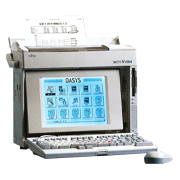The OASYS V series was Fujitsu’s new series of AT-compatible architecture1 Japanese word processors that doubled as computers. Fujitsu announced three models in the series in December 1994: the OASYS V-450sB model 270, the OASYS V-450sB/S2P model 420, and the OASYS V-466B/T2 model 420. These word processors were designed to serve two purposes — word processing and computing — for the end-user computing age.
- The OASYS V series had the following features:
- (1)All models were preinstalled with Microsoft Windows 3.1, a computer operating system, and MS-DOS 6.2/V, a first for a Japanese word processor.
- (2)It was possible to share and centrally manage files in open client-server environments due to the inclusion of PC Server Connect, a utility that stored documents on a NetWare server with the feel of a word processor.
- (3)OASYS V series word processors could use certain applications with Fujitsu’s FMV series computers.
- 1. AT-compatible architecture: A computer architecture that began with IBM’s PC/AT computers in 1984. It became a de facto standard in the computer industry and was adopted worldwide because it was an open architecture.
| Model name | V-450sB | V466B | |
|---|---|---|---|
| V-450sB model 270 | V-450sB/S2P model 420 | V-466B/T2 model 420 | |
| Introduced | December 1994 | December 1994 | December 1994 |
| CPU | 50 MHz i486SX2 | 66 MHz i486DX2 | |
| Memory | 4 MB (expandable up to 20 MB) | 8 MB (expandable up to 24 MB) | |
| Hard drive | 240 MB (OASYS partition: 50 MB, computer partition: 220 MB) |
420 MB (OASYS partition: 60 MB, computer partition: 360 MB) |
|
| Floppy drive | One 3.5-inch (1.44 MB, 1.2 MB, 720 KB) | ||
| PC card slot | One: JEIDA*1 Ver. 4.1 and PCMCIA*2 2.0 compliant | ||
| Expansion memory slot | One: accepted 4 MB, 8 MB, and 16 MB expansion memory cards | ||
| Modem card slot | One dedicated modem card slot (OAMDC303 slot optional) | ||
| Expansion bus slot | One 110-pin channel LAN adaptor or expansion box (two full-size slots optional) |
||
| Keyboard | Thumb shift keyboard (compliant with the NICOLA standard) or JIS keyboard Numeric keypad optional | ||
| Monochrome 10.4-inch LCD | DSTN 10.4-inch color LCD*3 | TFT 10.4-inch color LCD*4 | |
| 16-level grayscale 640 x 480 pixels |
Capable of simultaneously displaying 256 colors from a 4,096-color palette 640 x 480 pixels |
||
| External dimensions [mm] | 390 x 158 x 279 (w x d x h) | 390 x 158 x 327 (w x d x h) | 390 x 158 x 279 (w x d x h) |
| Weight | 7.9 kg | 9.5 kg | 7.9 kg |
| Power consumption | 42 W (56 W max.) | 70 W (84 W max.) | 52 W (65 W max.) |
*1. JEIDA: Japanese Electronic Industry Development Association. Later became JEITA. JEIDA Ver. 4.0 was a PC card slot standard.
*2. PCMCIA: Personal Computer Memory Card International Association, a U.S. industry group that created IC card standards for connecting cards with computers. PCMCIA established a PC expansion card standard together with JEIDA.
*3. DSTN: dual-scan super-twisted nematic. A type of LCD technology that improved upon STN technology. It could be produced more cheaply than TFT technology.
*4. TFT: thin film transistor. A type of LCD technology that gave faster response times and more vivid displays than previous technologies. It could also be easily scaled for larger screens.


